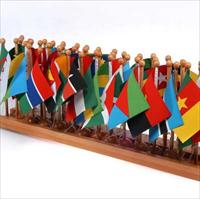Landslide UN vote in favor of Arms Trade Treaty

Today 147 states at the United Nations voted overwhelmingly to move forward with work on an Arms Trade Treaty (ATT). The Control Arms campaign, which represents millions of campaigners around the world welcomed the vote but called for more urgency from states to advance the process quickly and ensure a strong Treaty with human rights and development at its heart.
145 states supported for the Treaty and 2 others subsequently added their names, an increase on the 139 states who voted to start the UN process in October 2006, showing increasing global consensus in favor of the treaty. 116 of the yes voters also co-sponsored the resolution. The vote was particularly strong in Africa, South and Central America and Europe indicating strong demand for arms control both from countries severely affected by armed violence and from major exporters. Only the US and Zimbabwe voted against, ignoring increasing global consensus for an ATT.
Every day, over 1000 people are killed directly with firearms and many thousands more die indirectly as a consequence of armed violence or are driven from their homes, forced off their land, raped, tortured or maimed. Since the UN process started in December 2006, approximately 695,000 people have been killed directly with firearms, illustrating the urgent need for an Arms Trade Treaty. Any further delay means more lost lives.
Brian Wood from Amnesty International said:
“This big vote today moves the world closer to an Arms Trade Treaty with respect for human rights at its heart, the only way such a treaty can really stop the carnage. Today’s decision is that the principles of the UN Charter and other state obligations must be considered central to the Treaty. It is shameful that the US and Zimbabwe governments have taken an unprincipled stand today against a Treaty that would save so many lives and livelihoods.”
Anna Macdonald from Oxfam International, said:
“Most governments now support an Arms Trade Treaty and they must now move forward with urgency. Today’s vote is one step closer to turning off the running tap of irresponsible arms transfers which have flooded the world’s conflict zones for decades, fueling death, injury and poverty, such as is happening now in DRC. However we need leaps forward not steps, as every day lost means hundreds more lives lost.”
Mark Marge from the International Action Network on Small Arms said:
“This vote is a victory for the millions of campaigners in countries around the world. But we cannot afford to rest. All those against the misuse of arms will continue to pressure their governments to move quickly to implement a strong, legally binding treaty.”
Additional Information:
1. The Control Arms campaign is made up of Amnesty International, the International Action Network on Small Arms and Oxfam International. You can find out more on the Control Arms campaign and the Arms Trade Treaty at www.controlarms.org
2. Further to this vote the United Nations will set up an Open Ended Working Group to allow all states to discuss the potential text of an Arms Trade Treaty.
Background to the ATT process:
• In 2006 the resolution ‘Towards an Arms Trade Treaty’ was co-authored by Argentina, Australia, Costa Rica, Finland, Japan, Kenya and the United Kingdom and tabled for voting at the UN General Assembly, when 153 countries voted yes, 24 abstain and only the US voted No.
• The massive December 2006 vote set in motion a UN process to consider the feasibility, scope and draft parameters for an ATT during 2007 through submissions of views by states (over 100 submitted views, which was unprecedented) and during 2008 though examination by a UN Group of Governmental Experts. The latter Group reported back to the UN in August 2008 identifying some points of consensus and some differing views.
Why is the ATT vote this October so important?
• The resolution to be tabled by the co-authors is the critical next step to widen and deepen discussions amongst all states to enable stronger regulation of the global arms trade. It will set out the next stage in the process towards agreeing the framework, scope and principles of a legally binding treaty to bring the arms trade under much stricter control by states.
 Back and Next - Back and Next
Back and Next - Back and Next See Also - See Also
See Also - See Also